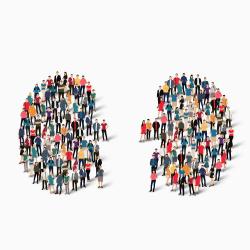Transplant and donation ethics
 The donation and transplantation of both organs and tissue continue to be a focal point for bioethical debate. Each year, more patients are added to tissue and organ waiting lists, and new waiting lists form as the range of potentially transplantable tissue expands. There are always fewer donors than potential recipients – hence the need for waiting lists. Some patients die waiting for an organ that may have prolonged their life. New ways of relieving pressure on waiting lists are being sought. These include increasing the numbers of donors (for example, using more living donors or older deceased donors), increasing the number of potentially eligible organs (for example, using ‘extended criteria’ organs), reducing the numbers of patients being listed and trying to allocated organs more efficiently. These potential solutions are not uncontroversial. For instance, is it right to allow patients to refuse an offer of a deceased donor organ in the hope of getting a ‘better quality’ organ later, or out of preference for a living donation from a family member? Should uterus transplantation be regarded as no more ethically problematic than gamete or embryo donation? Should children be prioritised over adults when waiting for transplants?
The donation and transplantation of both organs and tissue continue to be a focal point for bioethical debate. Each year, more patients are added to tissue and organ waiting lists, and new waiting lists form as the range of potentially transplantable tissue expands. There are always fewer donors than potential recipients – hence the need for waiting lists. Some patients die waiting for an organ that may have prolonged their life. New ways of relieving pressure on waiting lists are being sought. These include increasing the numbers of donors (for example, using more living donors or older deceased donors), increasing the number of potentially eligible organs (for example, using ‘extended criteria’ organs), reducing the numbers of patients being listed and trying to allocated organs more efficiently. These potential solutions are not uncontroversial. For instance, is it right to allow patients to refuse an offer of a deceased donor organ in the hope of getting a ‘better quality’ organ later, or out of preference for a living donation from a family member? Should uterus transplantation be regarded as no more ethically problematic than gamete or embryo donation? Should children be prioritised over adults when waiting for transplants?
The donation of reproductive material may involve special challenges and questions. In addition to issues regarding allocation of resources that are scarce, there are further issues such as whether parenting ability should be taken into account, and how to account for the fact that the donated material will eventually become a being (or more than one) with its own interests, preferences and personality.
- 2014-2017 A Shared Space and a Space for Sharing: A Transdisciplinary Exploration of trust and Empathy online (ESRC)
- 2015- 2020 BOUnD: Unspecified living kidney donation in the UK: barriers to implementation and delivery (NIHR)
- 2011 – 2016 ATTOM: Access to Transplant and Transplant Outcome Measures (NIHR)
Previous projects
- 2012-2013 An analysis of the ethical issues surrounding split liver transplantation, informed by stakeholder views
- 2010-2013 The ethical allocation of gametes donated for the purpose of fertility treatment
- 2009-2012 An empirically informed ethical analysis of directed and conditional deceased organ donation (AHRC and QE Hospital Birmingham Charity)
